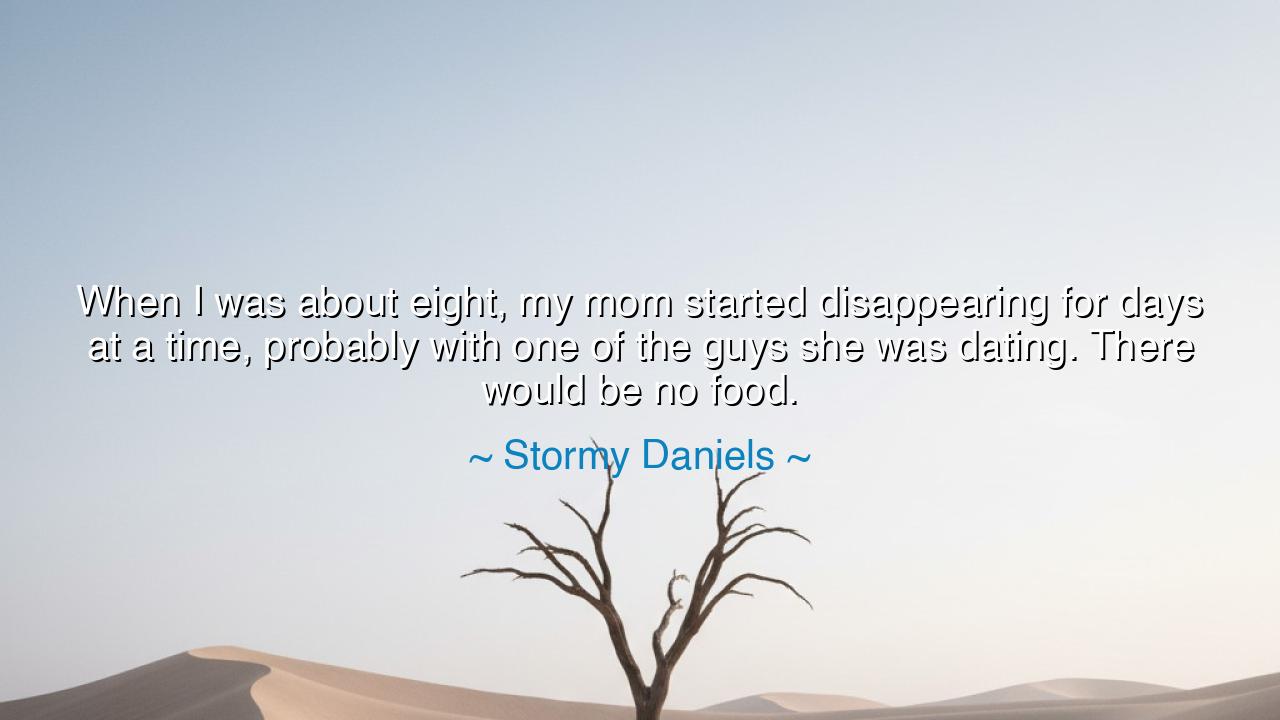
When I was about eight, my mom started disappearing for days at a
When I was about eight, my mom started disappearing for days at a time, probably with one of the guys she was dating. There would be no food.






Hear the raw and trembling words of Stormy Daniels, spoken from the depth of childhood’s shadow: “When I was about eight, my mom started disappearing for days at a time, probably with one of the guys she was dating. There would be no food.” These words, though simple in sound, echo with the ancient sorrow of abandonment, the ache that has haunted humankind since the dawn of family itself. They speak not merely of hunger of the body, but of hunger of the heart—of a child’s yearning for presence, stability, and love that were never given. In this confession lies a truth older than time: that the absence of care wounds more deeply than any blow, and that from such wounds, some rise stronger, forged by necessity into resilience.
The origin of this quote is deeply personal. Stormy Daniels—known to the public through fame, controversy, and courage—looked back upon the landscape of her youth, a world marked by instability and neglect. She remembered what it meant to be a child abandoned to uncertainty, to open the cupboard and find nothing, to learn that survival must come from within. In recalling this, she was not merely recounting a painful memory; she was revealing the crucible that shaped her strength. Her childhood, barren of security, became the ground upon which she built her defiance. The quote, therefore, is not only about pain—it is about origin and becoming, the seed of endurance planted in hardship.
The ancients understood well that greatness often grows from adversity. Consider the life of Cyrus the Great, founder of the Persian Empire, who, according to legend, was abandoned as a baby, left to die in the wilderness, and raised by a shepherd’s wife. From the hunger of his early days came the strength of vision that built empires. Or think of Frederick Douglass, born into slavery, denied the tenderness of a mother’s presence, who rose to become one of the greatest voices for freedom and human dignity. Such lives remind us that though neglect may starve the body, it can awaken a fire of survival that no comfort could ever kindle.
In Daniels’s memory, the disappearing mother becomes a symbol—a figure both tragic and universal. She represents not only one woman’s failure, but the failures of countless generations: when those who should protect instead vanish into their own wounds. Yet within the child who is left behind lies the possibility of transformation. Many who endure such beginnings grow hardened, angry, or lost. But some—through will, through vision, through unyielding spirit—transform their pain into purpose. To acknowledge suffering without letting it define you is to become, as the ancients said, tempered iron, unbreakable because you have already been broken and reforged.
There is a wisdom here that pierces the heart: the recognition that love is a necessity, not a luxury. Just as the body perishes without nourishment, so too does the soul falter without care. But when love is absent, and one survives despite it, one learns a rarer strength—the ability to create self-compassion. Daniels’s reflection calls us not only to pity, but to understanding: that the neglected child does not vanish. They walk beside us, in our choices, in our fears, in our hunger for belonging. To heal, one must look back upon that child and offer the love that was once denied.
Let this teaching, then, be a mirror for those who listen. If you have known abandonment, let it not become your identity, but your teacher. Let your hunger remind you to feed others. Let your loneliness make you more tender to those unseen. And if you are entrusted with the care of another—whether a child, a friend, or a soul in need—remember the power you hold. Your presence can be the difference between despair and endurance. As the proverb says, “One who is loved by one heart is richer than one who rules a kingdom.”
So, children of tomorrow, hear the wisdom buried in Daniels’s pain. Neglect may strip away comfort, but it cannot strip away the spirit’s potential to rise. What begins in emptiness can end in strength; what begins in silence can become a voice for others. Let her words remind you that every story, no matter how dark its beginning, can become a testament of survival, compassion, and renewal. For though the child may once have gone hungry, the soul that endures learns to feed the world with the bread of its hard-earned wisdom.






AAdministratorAdministrator
Welcome, honored guests. Please leave a comment, we will respond soon